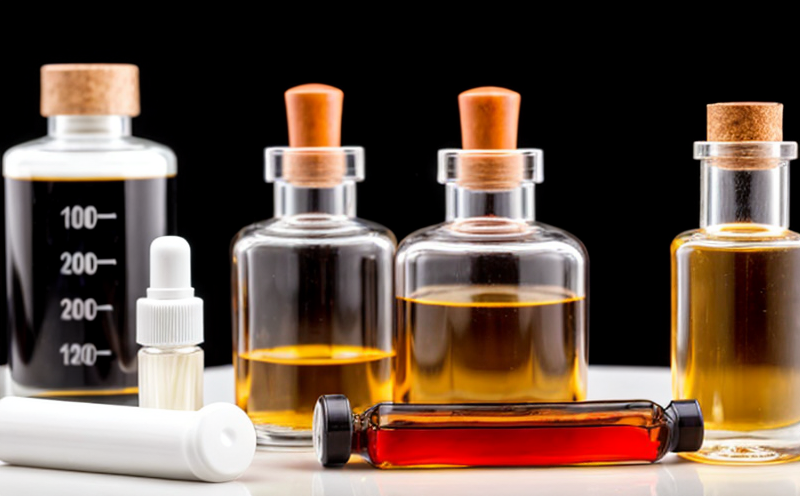Pharmaceutical Forced Degradation Testing
Pharmaceutical forced degradation testing is a critical analytical technique used to assess the stability and quality of drug substances and formulations. This method involves exposing active pharmaceutical ingredients (APIs) or formulated products to extreme conditions, such as heat, light, humidity, and oxidative stress, to simulate accelerated aging processes in a controlled laboratory environment.
The primary goal is to determine how these harsh environmental factors impact the chemical structure of APIs over time. By understanding these changes, pharmaceutical companies can ensure that their drug candidates meet regulatory requirements for safety, efficacy, and quality throughout all stages of development—from early R&D through post-market surveillance.
Forced degradation testing typically involves several steps: selection of appropriate stressors, preparation of the sample, incubation under controlled conditions, analysis using advanced analytical techniques like HPLC, LC-MS/MS, or NMR spectroscopy, and evaluation against established acceptance criteria. The results provide valuable insights into potential stability issues that may arise during storage or use.
Regulatory agencies such as the US FDA, EMA, and WHO require this testing for new drug applications (NDAs) and biologics license applications (BLAs). Compliance with these regulations is essential to ensure product safety and efficacy. Additionally, forced degradation studies help inform formulation development, manufacturing processes, packaging design, and storage guidelines.
At Eurolab, our team of experienced scientists specializes in conducting comprehensive forced degradation testing according to international standards including ICH Q1A (R2), ICH Q5C, and USP . Our state-of-the-art facilities equipped with advanced analytical instruments allow us to perform precise and accurate analyses. We offer customized solutions tailored to meet your specific needs while ensuring strict adherence to regulatory guidelines.
Our services include:
- Detailed characterization of APIs before forced degradation
- Exposure of samples to various stressors such as heat, light, humidity, and oxidation
- Monitoring changes in chemical structure through chromatography, mass spectrometry, or spectroscopy
- Evaluation against predefined acceptance criteria using statistical methods
- Comprehensive reporting including raw data, trend analysis, and recommendations for improvement
By leveraging our expertise in pharmaceutical chemistry combined with cutting-edge technology, Eurolab ensures that you receive reliable and actionable insights from your forced degradation tests.
| Stressor | Description | Effect on API Stability |
|---|---|---|
| Heat | Temperatures exceeding normal storage conditions | Potential decomposition, hydrolysis, and increased impurities |
| Light | UV or visible light exposure beyond typical usage scenarios | Photodegradation leading to reduced potency |
| Humidity | Exposure to high moisture levels not encountered during normal use | Increased hygroscopicity and solubility issues |
| Oxidation | Interaction with oxygen molecules causing chemical instability | Possible formation of undesired byproducts or degradation products |
| Analysis Method | Use Case | Advantages |
|---|---|---|
| HPLC | Determination of API purity and impurity levels | High sensitivity, resolution, and reproducibility |
| LC-MS/MS | Sensitive quantification of trace amounts of degradation products | Precise identification and measurement with minimal sample preparation |
| NMR Spectroscopy | Structural elucidation of API and intermediate species | Non-invasive, high-resolution structural information |
In summary, forced degradation testing plays a vital role in ensuring the quality and safety of pharmaceutical products. At Eurolab, we pride ourselves on providing accurate, reliable, and compliant results that can help guide your decision-making processes throughout drug development.
Industry Applications
Forced degradation testing finds application across various industries within pharmaceutical manufacturing. Here are some key areas where this service is utilized:
- New Drug Application (NDA)
- Biologics License Application (BLA)
- Formulation Development
- Manufacturing Process Optimization
- Packaging Design Evaluation
- Storage Guidelines Establishment
| Industry Segment | Specific Application | Outcome |
|---|---|---|
| New Drug Development | Evaluating the stability of novel APIs during early stages of development | Data-driven decisions to optimize formulation and process parameters |
| Manufacturing | Ensuring batch consistency and identifying potential quality issues before release | Improved quality control measures and reduced production downtime |
| Packaging & Storage | Evaluating the impact of packaging materials on product stability under various conditions | Optimized packaging designs that extend shelf life and protect against degradation |
Eurolab Advantages
At Eurolab, we pride ourselves on offering unparalleled quality and reliability in our forced degradation testing services. Here’s why choosing us makes sense:
- Achieving Regulatory Compliance: We strictly adhere to international standards such as ICH Q1A (R2), ICH Q5C, and USP , ensuring that your results meet all necessary regulatory requirements.
- State-of-the-Art Facilities: Our advanced analytical instruments provide precise and accurate data, giving you confidence in the quality of our services.
- Experienced Scientists: Our team comprises highly skilled chemists with extensive experience in pharmaceutical testing, ensuring thorough and reliable analysis.
- Customized Solutions: We offer tailored solutions to meet your specific needs, whether it's for a single API or an entire portfolio of products.
- Rapid Turnaround Times: By streamlining our processes, we can deliver results quickly without compromising on quality.
- Comprehensive Reporting: Our detailed reports provide not only the raw data but also trend analysis and actionable recommendations to help you make informed decisions.
With Eurolab, you gain access to world-class expertise in pharmaceutical chemistry combined with cutting-edge technology. Let us be your partner in ensuring product quality and regulatory compliance throughout all stages of drug development.
Environmental and Sustainability Contributions
By conducting rigorous forced degradation testing, we contribute positively to both environmental protection and sustainability efforts within the pharmaceutical industry:
- Promoting Sustainable Manufacturing Practices: Ensuring that APIs remain stable throughout manufacturing processes helps reduce waste and minimize environmental impact.
- Enhancing Product Stability: Longer-lasting products mean less frequent replacements, reducing overall consumption of resources.
- Supporting Green Chemistry Initiatives: Our services help identify more sustainable formulations and materials that can contribute to greener manufacturing practices.
We believe in fostering an industry culture focused on minimizing environmental footprints while maintaining high standards of product quality. Through our work, we aim to drive positive change towards a more sustainable future.





